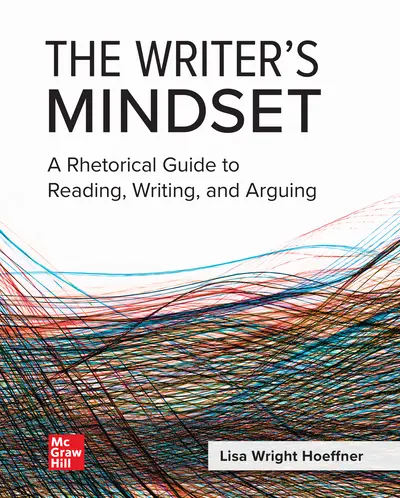My Account Details

ISBN10: 1260526348 | ISBN13: 9781260526349

* The estimated amount of time this product will be on the market is based on a number of factors, including faculty input to instructional design and the prior revision cycle and updates to academic research-which typically results in a revision cycle ranging from every two to four years for this product. Pricing subject to change at any time.
Instructor Information
Quick Actions (Only for Validated Instructor Accounts):
To become good writers, students must learn more than a writing process: they must develop a writer’s mindset—the rhetorical skills to read critically, analyze and synthesize sources, and write with their audiences in mind. How can we help students with the challenges involved in thinking like a writer? By using incremental steps that move from literal thinking to analytical and critical understanding, The Writer’s Mindset 1e makes the development of college-level writing capabilities possible for all students, whatever their level of preparedness.
The Writer’s Mindset provides students with tools to transform the way they approach reading, writing, and arguing through five key pillars:
• Rhetorical Focus
• Incremental Approach
• Embedded Support
• Student Appeal
• Instructor Support
1 What Is a Writer’s Mindset?
2 Reading with a Writer’s Mindset
3 Composing with a Writer’s Mindset
4 Using Rhetorical Patterns as Tools
PART 2 WRITING PURPOSES
5 Writing to Reflect
6 Writing to Inform
7 Writing to Analyze
8 Writing to Evaluate
9 Writing to Persuade
PART 3 RESEARCH STRATEGIES
10 Conducting Research
11 Using Sources Accurately and Ethically
12 Documenting Sources in MLA and APA Style
PART 4 ARGUMENTS IN DEPTH
13 Recognizing Arguments
14 Analyzing an Argument’s Elements
15 Understanding an Argument’s Appeals
16 Recognizing Fallacies
17 Writing a Rhetorical Analysis
18 Classical, Rogerian, and Visual Arguments
PART 5 WRITING A RESEARCHED ARGUMENT
19 Planning an Argument
20 Selecting Evidence and Drafting Reasons
21 Drafting Counterarguments, Intro¬ductions, and Conclusions
22 Revising and Finishing Your Argument
PART 6 AN ANTHOLOGY OF READINGS
PART 7 HANDBOOK OF READING AND WRITING SKILLS
1 Improving Your Reading Skills
2 Improving Your Writing Skills
Accessibility
Creating accessible products is a priority for McGraw Hill. We make accessibility and adhering to WCAG AA guidelines a part of our day-to-day development efforts and product roadmaps.
For more information, visit our accessibility page, or contact us at accessibility@mheducation.com
Affordability
Reduce course material costs for your students while still providing full access to everything they need to be successful. It isn't too good to be true - it's Inclusive Access.
Need support? We're here to help - Get real-world support and resources every step of the way.